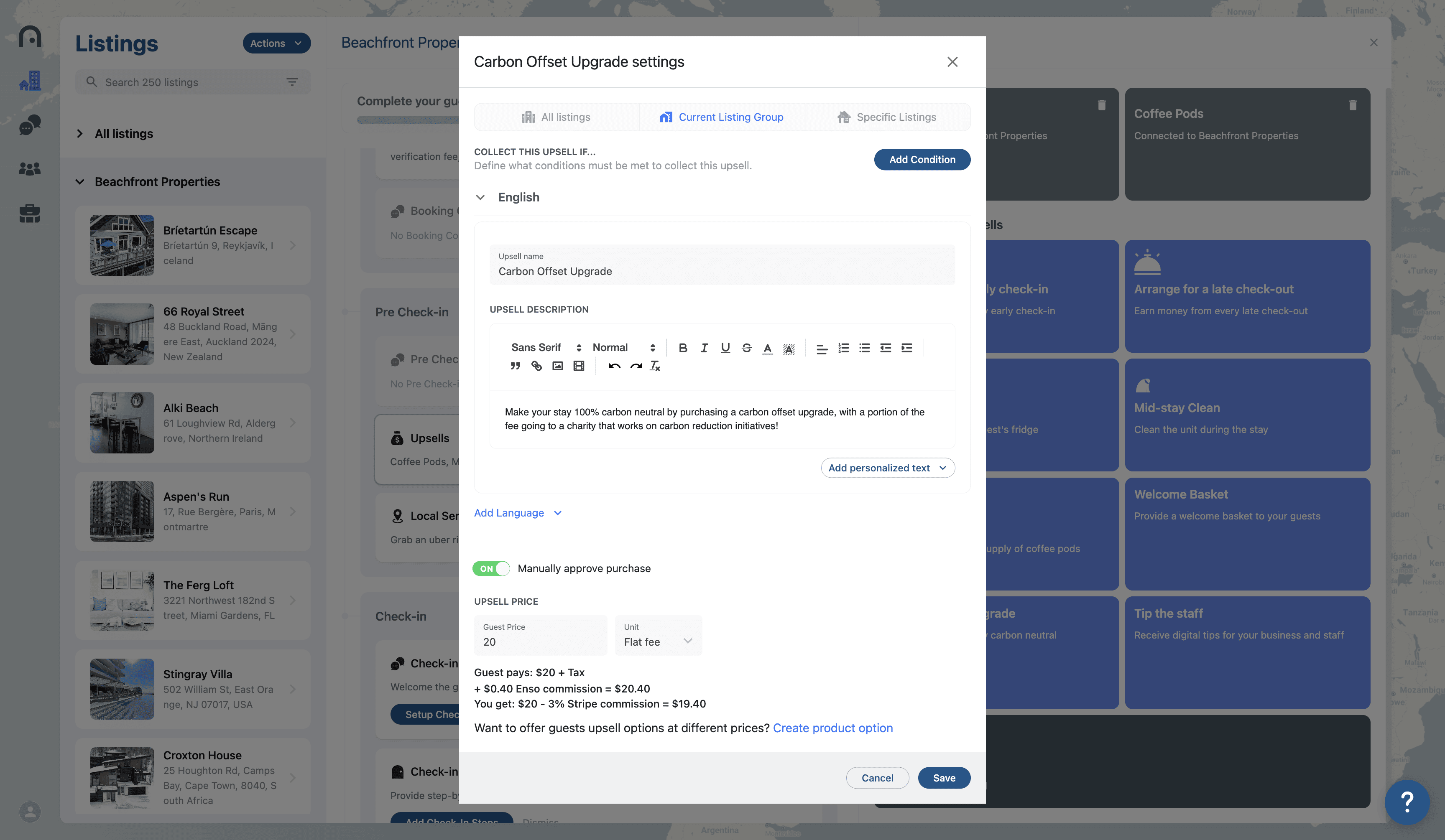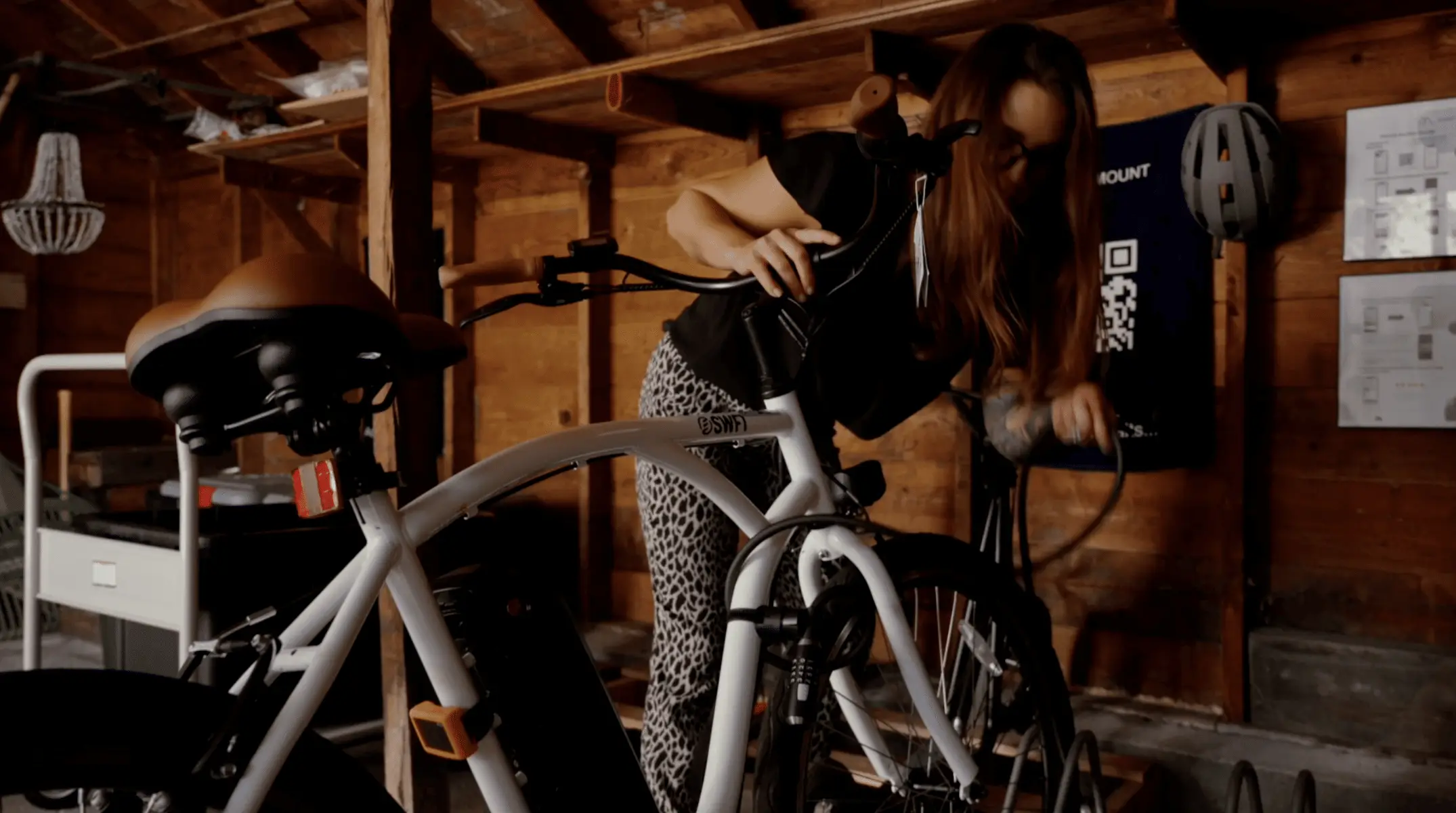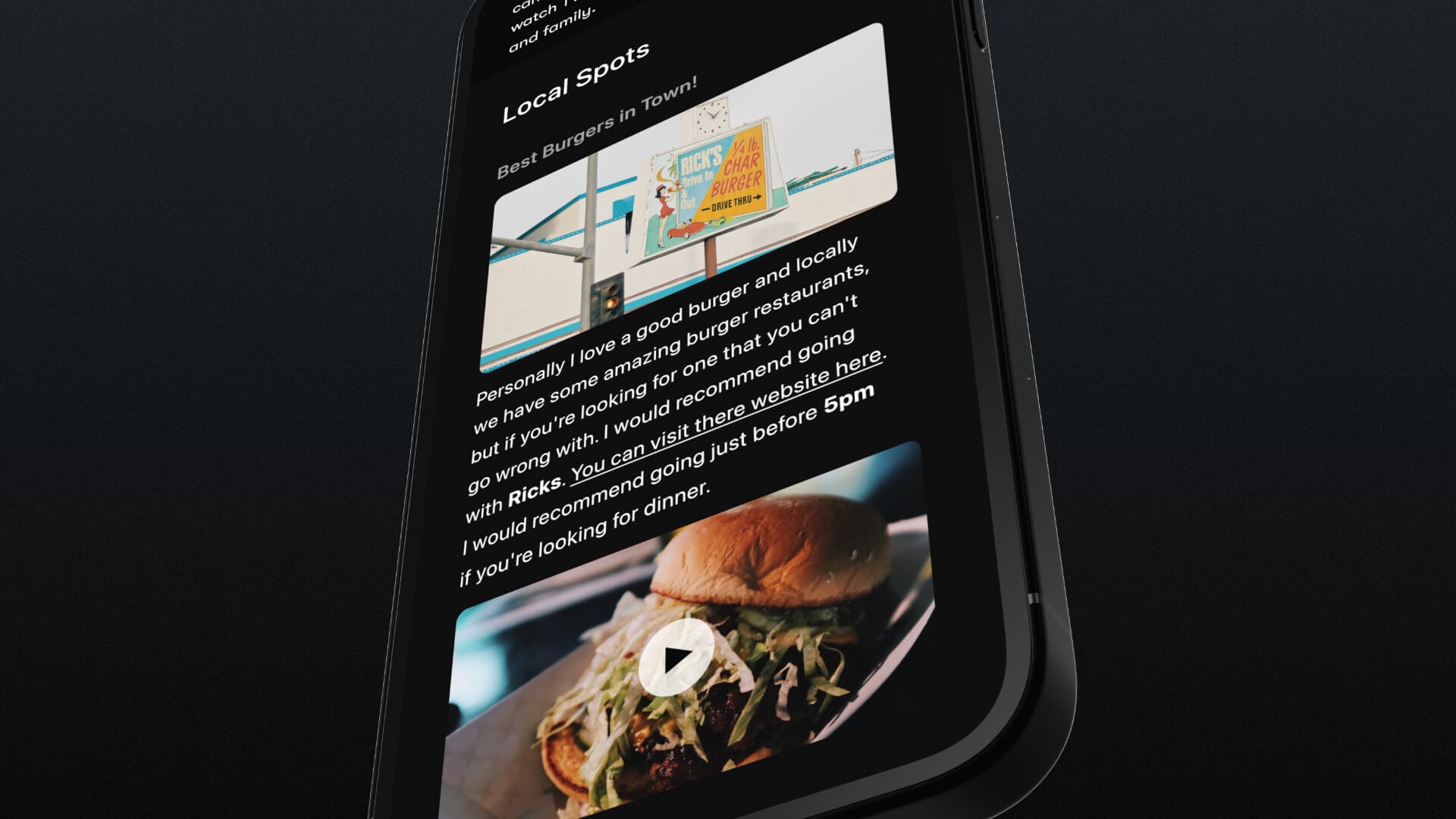Sustainability has become a growing concern for people all around the world. In the hospitality and travel industry, it is crucial for operators to implement sustainable practices to reduce their environmental impact. In the recent years hospitality businesses learned that contributing to eco-tourism and sustainability also helps maximizing profitability. With hospitality technology advancement and tools available today vacation rental professionals can create sustainable practices for their properties and guests. In this article we will cover how hospitality professionals can embrace technology to create sustainable rentals.
What are eco-friendly vacation rentals?
Eco-friendly vacation rentals are accommodations that are designed and operated with a focus on minimizing their impact on the environment. These types of vacation rentals typically use sustainable materials and practices, incorporate energy-efficient systems and appliances, and encourage guests to participate in environmentally friendly activities during their stay. Some examples of eco-friendly short term rentals include properties that use solar panels for power, provide organic and locally sourced food options, and have recycling and composting programs in place.
Eco-friendly vacation rentals can be found in a variety of settings, from secluded cabins in the wilderness to luxurious villas on the beach. By choosing to stay in an eco-friendly vacation rental, global travelers can enjoy a unique and sustainable travel experience. This is simultaneously reducing their impact on the environment.
Why does every hospitality business need to be sustainable?
Sustainability is no longer a “nice to have”, it has become a necessity for the world and for the business. A good business. It should be seen as an untapped opportunity to drive happy customers, healthy business, and improve profits.
Here are the top 5 reasons of why hotels and short-term rental industry must embrace sustainability:
Preserving our planet: for future generations and the business
As the world is fighting the Triple planetary emergency of climate disruption, nature loss and pollution, the hospitality industry needs to play its part.
Our industry is responsible for around 1% of global carbon emissions, as well as greenhouse gas production, use of single-use plastic, water and energy waste, and more. We must take action to mitigate these effects. Additionally, our industry heavily depends on the natural world to attract guests, making it crucial that we prioritize its preservation.
By implementing sustainable practices such as energy-efficient systems and waste reduction programs, hospitality businesses can reduce their carbon footprint and help mitigate climate change.
Saving money
The increasing costs affect hotels and vacation rental companies directly, reporting an average 30% increase in operational costs. Higher energy and water bills, increased costs for cleaning and laundry services, food and more are impacting the bottom line.
Sustainable practices can help hospitality businesses save money on operating costs. For example, energy-efficient systems can reduce utility bills, while waste reduction programs can lower waste disposal costs.
The impact of energy crisis on Hospitality in Europe and United States
This winter energy costs were skyrocketing globally, hitting Europe the hardest with natural gas prices 10x higher than last year. Energy companies failing, bills rising, and the local economy suffering. The US, China, and Brazil are also experiencing surging fuel prices affecting spending, logistics, hiring, etc. Old, inefficient buildings in Europe and Canada’s rental stock worsen the situation, especially in colder regions and hot US states. Local governments help businesses with high energy bills.
Read more about Energy crisis: impact on hospitality businesses
Attracting more guests
More and more consumers are becoming environmentally conscious and seek out businesses that prioritize sustainability. Latest research reveals that approximately 6 in 10 travelers would choose sustainable lodging if given the option and 1 in 3 would pay extra for it. Committed operators can enhance their reputation, appeal to new audiences, and boost revenue by implementing sustainable practices.
What is sustainable tourism?
Sustainable tourism, also referred to as ecotourism or green tourism, is a type of tourism that aims to acknowledge and take responsibility for its impact on economy, society and environment. This involves considering the needs of the environment and the local community, people visit while traveling. Such concerns as increase in greenhouse gas, overcrowding, and the erosion of socio-cultural identity in communities have prompted the necessity of more sustainable and ethical tourism practices. More and more people become aware and committed to these practices.
Diversifying revenue
Additionally, travelers who are willing to pay more for eco-friendly lodging are also interested in other green initiatives. Offering environmentally-friendly upsells such as emissions-free transportation, locally-sourced products, etc., you can expand your revenue streams and engage guests in “doing good”. By allowing your guests support local communities you’ll make them feel less like tourists.
Complying with regulations
Furthermore, implementing sustainable practices can help hospitality businesses comply with regulations and laws related to environmental protection. Failure to comply with these regulations can result in fines, negative publicity, and damage to the business’s reputation.
Overall, every hospitality business should strive to be sustainable not only for the benefit of the environment but also for the benefit of their bottom line and reputation.
Top 5 tech tools to make vacation rentals sustainable
Custom Upsells
Enso Connect dynamic platform facilitates hospitality upsells that can be customized and automated to the unique needs of the business. This enables vacation rental operators to engage their guests in initiatives, helping support the environment and local communities.
An example of such initiatives is the Carbon Offset Upgrade, which allows guests to offset their carbon footprint by paying for carbon credits. A portion of the proceeds goes towards a charity that supports carbon reduction initiatives. This feature is cost-effective and affordable for all types of travelers.
Short-term rental operators can choose a guest initiative for donation or action and create their own upsell. They can prompt guests to donate to a local charity, volunteer for a beach clean up, or other similar activities.

Sustainable Transport
Another great way to implement green initiative is offering your guests a sustainable means of transportation. Property managers and owners promote eco-friendly exploration of the destination by encouraging visitors to use bikes, e-bikes, or boats instead of polluting transportation. Some short-term rentals provide these options for free, while others offer rental amenities to generate more revenue.
As electric vehicles become increasingly popular, hospitality business owners are recognizing the need to offer electric vehicle charging solutions to their guests. By providing these amenities, rental properties can attract environmentally conscious guests who own or rent electric cars. Many vacation rental properties are installing EV charging stations to accommodate these guests and to provide a convenient and sustainable way to power their vehicles. There are ways to automate these solutions, such as OK2Charge service.

Digital Guidebooks
Having digital guidebooks are great tools to curate local services, products and provide guests with instructions for a sustainable stay. An example can be the Live Like a Local Guide, which suggests local restaurants and shops. These are easy ways to educate guests on best practices for recycling, consuming less energy, water usage reduction, and promoting environmental giving.

Energy Efficiency and Smart Home Integrations
There are different ways to use smart home devices, smart thermostats, climate control systems, noise control devices, and leak detection systems in sustainable properties. With these integrations rental businesses can optimize day-to-day operations, save money on energy usage, water consumption and keep operations low-touch. Keyless entry solutions, such as smart locks, allow to limit the number of on site staff and suppliers and reduce waste.
Showcasing Sustainability Initiatives in the Guest App
Vacation homes and professionals should showcase their sustainability efforts in all owned channels: the website, social media and guest apps. For example, companies that participate in 1% for the Planet, display the initiative logo on their website, and provide guests with an opportunity to donate to the charity.
Analytics and Reporting
Being able to track the energy consumption, carbon footprint, and sustainability initiatives’ impact allows operators to make conscious choices. The can make informed decisions and identify areas where they can improve their sustainability practices.
Sustainability resources for property managers and hosts
We would like to share a couple of great sustainability resources for the short-term rental industry.
EnviroRental
A one-stop-shop free sustainability resource tailored specifically for short-term rental businesses that was launched in December 2022. The founder of this resource is Bob Garner, an industry sustainability advocate. Bob is also the award winning owner of Casal Dei Fichi, the top eco-friendly place to stay in Italy.
EnviroRental was specifically designed for hospitality businesses that want to make their rentals more sustainable but don’t know where to start.
Rent Responsibly
The Rent Responsibly platform is designed to foster a sense of community and provide educational resources for those involved in short-term rentals. Its aim is to simplify the process of connecting hosts and accessing useful information, leading to successful short-term rental alliances. The platform offers a free resource library covering sustainability, advocacy, and other information, helping elevate and protect short-term rental hosting.
Sustonica
The first sustainability accreditation service for vacation rentals. The company, founded by Vanessa De Souza Lage, a short-term rental though leader and activist, aims to unite the vacation rental industry under a unified sustainability standard and inspire guests to adopt sustainable practices.
The Sustonica certification program evaluates the sustainability practices of vacation rentals based on seven of the United Nations Sustainable Development Goals. These goals include energy efficiency, water conservation, waste management (such as recycling bins, refillable dispensers, single-use plastics, etc.), and social responsibility (including cultural heritage site recommendations, noise monitoring, wheelchair accessibility, etc.).
To receive certification, rentals must meet at least 12 out of 40 guidelines. In order to minimize the time investment for property managers, the homes are remotely checked via a 15-minute WhatsApp video call with either the cleaning staff, check-in staff, owner, or manager. The certification is valid for one year.
The Green Path Podcast
with Deborah Labi
The Green Path Podcast is a ‘platform’ to help share the word about sustainability in the vacation rental industry.
Conclusion
The good news is that hospitality is equipped with technology empowering operators to create sustainable practices for properties and guests. By implementing these tools, operators can reduce their carbon footprint, save energy and money, and attract sustainability-minded guests. With the growing concern for the environment, sustainable practices are becoming increasingly essential for vacation rentals to remain competitive in the hospitality industry.
See how Enso Connect can help you implement sustainable practices in your hospitality business







